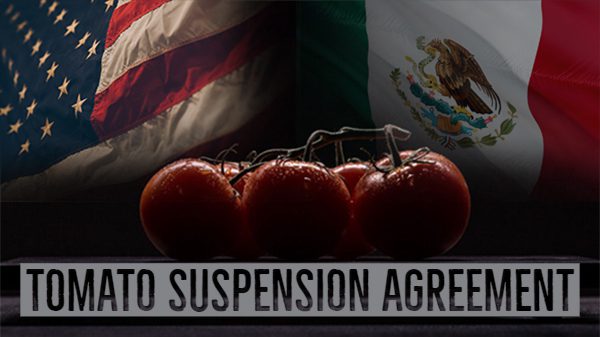While it looks like we’re closer to an agreement between Mexico and Florida on changes to the 2013 Tomato Suspension Agreement, there several sticking points.
Lance Jungmeyer, CEO of the Fresh Produce Association of the Americas, said the letter to the U.S. Commerce Department from Mexican growers, and the subsequent statement of cooperation from the Florida Tomato Exchange, was a positive step.
“It’s much more positive than a few days ago,” he said April 9. “The (Mexican) concessions show they’ve gone a lot of the way, but Florida hasn’t backed off some key asks.”
Jungmeyer said one of the biggest sticking points is the provision that the reference price must be applied beyond the first sale.
The Florida group has had this as a provision since its 2017 letter to the Commerce Department on the agreement.
In that letter, Florida growers said “The clearest evidence that there is circumvention of the Agreement can be found in the prices further down the supply chain, particularly at the wholesale level in terminal markets. Mexican tomatoes are regularly sold for prices well below the corresponding reference prices in the second or third sales transaction, especially when factoring in shipping costs to destinations such as Philadelphia and New York. Any renegotiated Suspension Agreement should stipulate that the remitted reference price be applied to all non-retail purchases within the U.S. through the last full (unbroken) case-lot sale; not just the first sale. In this arrangement, the seller and the receiver should both bear accountability for a transaction below the reference price.”
Jungmeyer said this provision would put importers of Mexican tomatoes in a bind by limiting the types of companies they could sell to.
“As importers, taking out the second, third or fourth sales, would take them out of selling to wholesalers,” he said. “It also may be an anti-trust concern because Mexican growers couldn’t agree to something affecting the U.S. Commerce Department, and it would change PACA.”
The Florida Tomato Exchange said April 10 that it plans to comment next week on the Mexican proposal.
The Florida Fruit and Vegetable Association deferred comment to the tomato exchange.
Another item Florida growers proposed two years ago is updating the definition of “controlled environment” growing, which the Mexican group didn’t address.
However, there are a handful of items the Florida group asked for which were address in the Mexican proposal, such as eliminating the seasonality reference price change and enforcement and audits.



